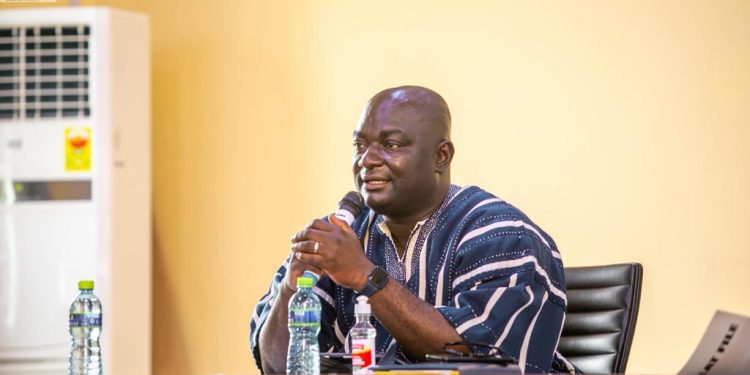The New Patriotic Party (NPP) Member of Parliament for Mpraeso Constituency, Hon. Davis Ansah Opoku has presented a legal argument refuting recent claims by Hon. Haruna Iddrisu, former Minority Leader, that any sitting MP contesting as an independent candidate inevitably lose their seat in Parliament.
According to Hon. Opoku, this interpretation lacks a nuanced understanding of the 1992 Constitution of Ghana and its provisions regarding the conduct of Members of Parliament (MPs) who depart from their political party.
In his statement, Hon. Opoku emphasized that the constitutional provision cited by Hon. Iddrisu, specifically Article 97(1)(g) of the 1992 Constitution, needs careful interpretation.
“While Article 97(1)(g) of the 1992 Constitution stipulates that an MP must vacate their seat if they leave the party on whose ticket they were elected or if they remain in Parliament as an independent candidate, it is crucial to emphasise that this provision applies only if an MP formally changes their political status while serving in Parliament.
“The Constitution does not permanently prevent a former MP from contesting future elections as an independent candidate after vacating their seat during their term”.
Hon. Davis Ansah Opoku, Member of Parliament for Mpraeso Constituency
This interpretation, according to him, is critical for upholding the rights of MPs to contest elections freely after their tenure, without being bound to party decisions.
The Case of Andrew Asiamah Amoako: A Misinterpreted Precedent?
In supporting his argument, Hon. Opoku revisited the case of Hon. Andrew Asiamah Amoako, an MP who was expelled by the NPP and later contested and won his seat as an independent candidate.
According to Hon. Opoku, the ruling by then-Speaker Prof. Mike Oquaye that Hon. Asiamah vacated his seat upon leaving the NPP has been widely misinterpreted.
Hon. Opoku contested the broader conclusion that expulsion from a political party should automatically lead to an MP losing their seat.
“Andrew Asiamah did not voluntarily resign from the NPP; he was expelled. This distinction is crucial because Article 97(1)(g) only addresses voluntary actions by an MP, such as choosing to leave the party or remaining in Parliament as an independent”.
Hon. Davis Ansah Opoku, NPP Member of Parliament for Mpraeso Constituency
He argued that the expulsion of the current second Deputy Speaker, Hon. Asiamah should not have automatically triggered his removal from Parliament.
This interpretation, according to the Mpraeso lawmaker, is essential to protect parliamentary independence and ensure that MPs are not unjustly removed based on internal party politics.
He further emphasized that the Constitution does not grant political parties the power to expel MPs from Parliament and that such actions should be subjected to constitutional scrutiny, not internal party rules.
Protecting Parliamentary Independence
Hon. Opoku warned of the dangers of allowing political parties to have unchecked power over their MPs.
He argued that enabling parties to unilaterally remove MPs for breaching party rules would give them disproportionate control over the legislative process, which could stifle dissent and erode Parliament’s independence.
“Parliament must retain its independence from political parties,”Hon. Opoku stressed, adding that the MPs’ primary obligation is to their constituents, not to party leaders.
“Allowing parties to expel MPs from Parliament unilaterally would give them disproportionate control over their members. It could suppress dissent or punish MPs who do not strictly follow the party line.
“This would contradict the spirit of parliamentary independence and undermine the democratic principle that MPs are representatives of the people, not mere agents of their parties.”
Hon. Davis Ansah Opoku, NPP Member of Parliament for Mpraeso Constituency
Constitutional Supremacy: The Zanetor Case
The Member of the Public Account Committee of Parliament also drew parallels with the Supreme Court’s ruling in the Zanetor Agyeman-Rawlings case, which reaffirmed the supremacy of the 1992 Constitution over party rules.
In that case, Hon. Opoku noted that the Court ruled that party regulations cannot supersede the constitutional rights of individuals, underscoring the primacy of constitutional provisions over internal political decisions.
Similarly, Hon. Opoku argued that Article 97(1)(g) does not provide political parties with the authority to remove MPs from Parliament simply by expelling them.
The article, he insisted, was designed to address cases where MPs voluntarily switch political status, not situations where their party decides to expel them.
Clarifying Speaker Prof. Oquaye’s Ruling
While Hon. Opoku acknowledged that Prof. Oquaye’s ruling carries significant weight, he called for a more nuanced understanding of its legal implications.
He argued that the ruling should be viewed as an interpretation of the constitutional provision, not a definitive legal mandate.
“Prof. Oquaye’s decision is influential, but it should not be regarded as the final word on the matter. The Constitution is clear that it is the MP’s actions, not the party’s, that trigger the vacation of a seat.”
Hon. Davis Ansah Opoku, NPP Member of Parliament for Mpraeso Constituency
Hon. Davis Anasah Opoku concluded by asserting that political parties should not have the power to remove MPs simply for breaking party rules, and such actions must be grounded in constitutional authority.
He called for the protection of MPs’ rights to represent their constituents freely, without undue influence from political parties.
In his comprehensive rebuttal, Hon. Davis Ansah Opoku raised critical questions about the balance between party discipline and parliamentary independence in Ghana’s democratic framework.
His defence of MPs’ rights, grounded in constitutional interpretation, serves as a reminder that Parliament’s independence must be safeguarded, and the democratic principle that MPs are representatives of the people should always be paramount.
By challenging Haruna Iddrisu’s stance, Hon. Opoku called for a reevaluation of how political parties interact with their elected MPs, ensuring that constitutional oversight prevails over internal party politics.










Discussion about this post